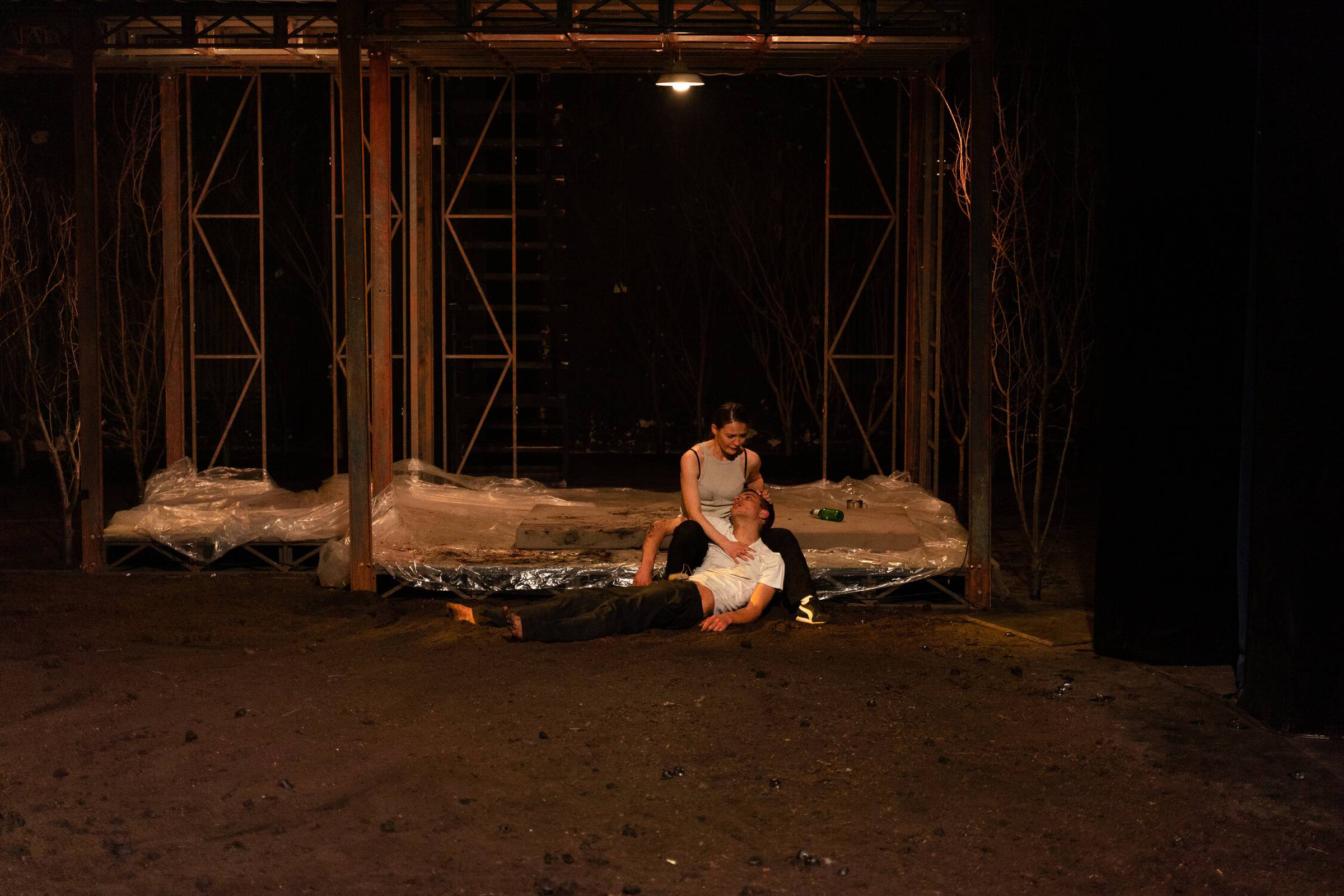
Katzelmacher. If it wouldn't be about love
by Rainer Werner Fassbinder –– Directed by: Eugen Jebeleanu (a. G.)
Bruno works for Elisabeth, at her company which produces miracle bags, bags of sweets, and toys, like those sold in Germany decades after the Second World War. Bruno dreams, in fact, of a different life, but he stays with Elisabeth. Ingrid wants to be a pop singer, Marie is with Erich, and Helga is with Paul. Frustration and boredom reign in the German suburb where the young people live. But when the Greek Jorgos shows up, the little world turns upside down, sparking xenophobia, envy and hatred.
"Katzelmacher" is the derogatory term used to describe the foreign workers Germany recruited to Europe in the 1960s. Originally probably derived from "Kesselmacher", from the itinerant craftsmen of southern Europe, the play written in 1968 by author and director Rainer Werner Fassbinder paints a sober and radical picture of a society that uses foreign workers but excludes them from society. Katzelmacher is considered his first independent play. The film of the same title was a breakthrough for Fassbinder, who was only 24 at the time.
Duration: 02:15
Cast
Isa Berger
Gunda
Silvia Török
Elisabeth
Daniela Török
Marie
Olga Török
Ingrid
Oana Vidoni
Paul
Harald Weisz
Jorgos
Niko Becker (a.G.)
Bruno
Rareș Hontzu
Erich
Alexandru Mihăescu
Franz
Radu Brănici (a.G.)
Eugen Jebeleanu (a.G.)
Dramaturgy assistance
Yann Verburgh (a.G.)
Direction assistance
Daniel Ghidel
Sets and costumes
Velica Panduru (a.G.)
Scenography assistance
Sabina Reus (a.G)
Video Design
Marius Panduru (a.G.)
Sound Design
Alex Halka (a.G.)
Foto-Video
Ovidiu Zimcea
Make-up
Bojita Ilici
Technical direction
Costinel Stănescu
Adrian Georgescu
Press excerpts
However, if I had to point out an exemplary success, from several points of view, I come back to Eugen Jebeleanu's performance of Katzelmacher. If It Wouldn't Be About Love, after Rainer Maria Fassbinder at the German Theatre in Timișoara. Jebeleanu knew how to create a whole context around his performance, alternating filmed spaces and spaces performed live. It is played on all levels, the images are fluidly interwoven, it is about loneliness, about imbecilic violence or the ordinary racism of the common man, from close to close. It's interesting how Jebeleanu has managed to speak in this text written in Germany 50 years ago about the violence and cruelty of today's Europe, in bloody and miserable images, filmed in slaughterhouses, alongside migrant workers from the poor and cheap East. Once again, Eugen Jebeleanu's show impresses, but above all convinces, lucid and ferocious.
Mirella Patureau, theater critic
https://dilemaveche.ro/sectiune/regimul-artelor-si-munitiilor/anul-teatral-2021-o-ancheta-633991.html
The young people in Jebeleanu's show have no other concerns than drinking, smoking, "fucking". They get a bit bored. And then they have time to get involved with those who don't belong to them, who are pushing their country, who come with their communism. The language is natural, without curtains, the way the young people of yesterday and today speak. And yet they go to church, they go to light candles, to say prayers to God. What for? Just to observe the customs?
Mihai Brezeanu, theater critic
https://agenda.liternet.ro/articol/25923/Cristina-Smadea/Scop-atins-spectator-emotionat-de-Katzelmacher-Wenn-das-mit-der-Liebe-nicht-war-Katzelmacher-Daca-n-ar-fi-vorba-despre-iubire-la-FNT-2021.html
Fassbinder's characters first experience a sense of fear of this katzelamcher taking their jobs (an unwanted one), then loathing and finally anger. It's a phenomenon that has occurred on a mass scale in Germany and is still being reproduced in other countries. On the one hand, foreign workers are exploited - paid less than locals, poor working and living conditions, etc. - on the other, they are harassed by locals and are the pretext for xenophobic movements. I say pretext because the chauvinist attitude has deeper roots, it is rather driven by personal entrapment in a failed social mechanism.
Oana Soica, theater critic
https://www.scena9.ro/article/teatru-katzelmacher-eugen-jebeleanu-fnt
The fabulous actors of the German State Theatre in Timișoara (Isa Berger, Silvia Török, Olga Török, Daniela Török, Oana Vidoni, Harald Weisz, Niko Becker, Rareș Hontzu, Alexandru Mihăescu and Radu Brănici) are impeccably directed by Eugen Jebeleanu in this performance that is a disturbing manifesto for tolerance. Eugen Jebeleanu seems to say with all his creative force: "I am the Stranger!".
Gabriela Lupu, theater critic
https://www.b-critic.ro/spectacol/teatru/eu-sunt-strainul/
The jewel produced by the host theatre, Katzelmacher, was also about powerful confrontations, taken to the limit of atrocity, this time social, about the refusal of the stranger, arbitrarily chosen as scapegoat for the unfulfillments of individual existence. If it wasn't about love, based on Fassbinder's script, directed by Eugen Jebeleanu. A complex performance, which marks a significant leap in the director's evolution, dense and consistent, both in the issues addressed and in theatrical expression. The director does not abandon his fundamental interest, the study of those in vulnerable situations, but his language becomes more elaborate, more nuanced, more open to multipurpose theatrical solutions. With a troupe that displays impeccable acting, with Velica Panduru's scenography, which gives rhythm to the space, combining the different volumes and planes with a special plasticity, the performance unfolds both violence and beauty, sensitivity and social meditation.
Cristina Rusiecki, theater critic
https://www.b-critic.ro/spectacol/teatru/zodia-confruntarilor/
Trailer
Photos











